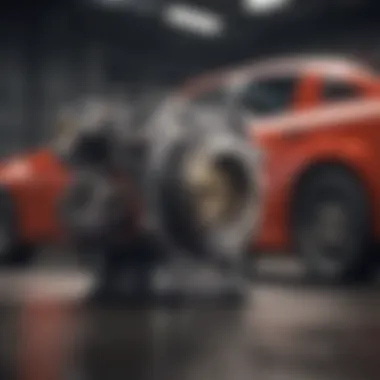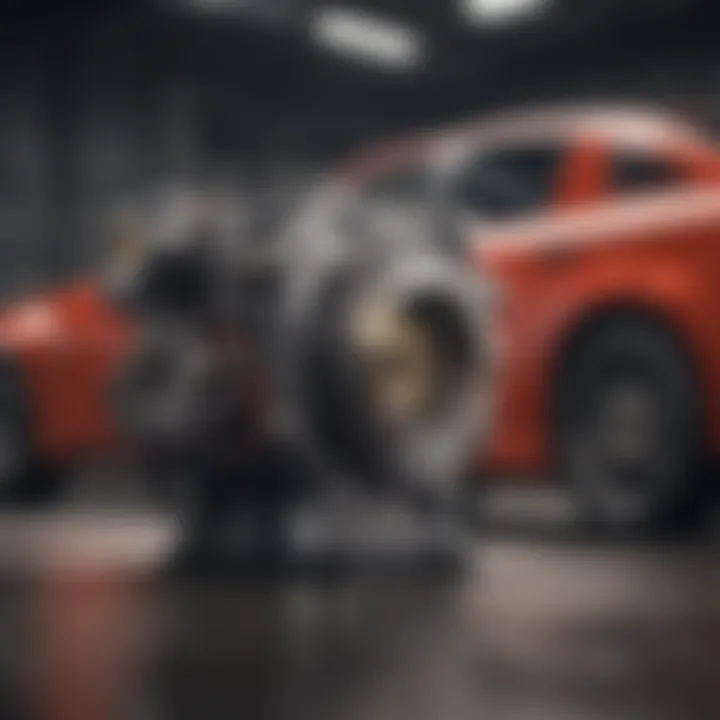Chevy Oil Pump Insights: Mechanisms and Maintenance


Intro
The oil pump in Chevy vehicles is an often overlooked but crucial component that plays a significant role in engine functionality. Understanding the ins and outs of these pumps not only informs car enthusiasts about their performance but also equips them with knowledge for maintenance and troubleshooting. Dive into the intricate mechanisms at play, and unearth the relationship between an oil pump and the overall efficiency of your engine.
A well-functioning oil pump ensures that the lubricating oil circulates throughout the engine, minimizing friction and wear on internal components. From classic models to modern performance cars, the design and function of oil pumps have evolved significantly alongside technology. With that said, let’s roll into the section that outlines the innovative features and advancements in the automotive industry, especially focusing on Chevrolet's oil pump technologies.
Preface to Oil Pump Functionality
The oil pump plays a linchpin role in the smooth operation of Chevy engines, acting as the circulatory system that ensures all moving parts are lubricated and functioning efficiently. Without it, the engine's life expectancy diminishes drastically, as heat and friction take their toll on vital components. This section delves deep into how oil pumps enhance performance, optimize operational longevity, and transform the driving experience from a clunky struggle to a seamless joyride.
Role of the Oil Pump in Engine Performance
When discussing engine performance in Chevy vehicles, the oil pump is often outshined by flashier components like turbochargers or exhaust systems. However, make no mistake—the oil pump deserves its moment in the spotlight. It is responsible for ensuring proper oil flow, maintaining pressure, and delivering lubrication where it is needed most.
High-quality lubrication translates to reduced wear on bearings, pistons, and other moving parts. This means better engine responsiveness and efficiency—think of it as a well-oiled machine that runs smoothly at all times. It is crucial to recognize that an effective oil pump can be the difference between a seamless engine performance and catastrophic failure on the road.
Overview of Oil Circulation in Chevy Engines
In essence, oil circulation in Chevy engines is a meticulous dance of fluid dynamics. The oil pump draws in the engine oil from the oil pan and propels it through the engine's oil galleries to vital components like valve lifters, camshafts, and crankshaft bearings. This circulating system creates a protective barrier of oil that not only minimizes friction but also helps to dissipate heat, a critical factor during high-performance runs.
The entire process is tightly regulated to ensure that under varying conditions—be it a cold start in winter or a soaring temperature during summer—the oil pump functions optimally. If the circulation is poor, oil might not reach essential areas, leading to increased heat and wear. A well-maintained oil pump ensures that oil cuts through the engine like butter, allowing for reliable performance even in challenging conditions.
"Maintaining proper oil circulation is like feeding the engine with nutrients; it keeps everything in check and functioning at peak efficiency."
Types of Chevy Oil Pumps
Understanding the types of oil pumps in Chevrolet vehicles is crucial for anyone involved with the maintenance or enhancement of these engines. Each type brings its own advantages, and knowing which pump to choose can lead to better engine performance and reliability. The main types of Chevy oil pumps are standard, high-performance, and variable displacement pumps. Each has a particular role that affects how oil circulates, which in turn impacts the engine's efficiency and longevity.
Standard Oil Pumps
Standard oil pumps are the unsung heroes in everyday Chevy vehicles. They’re designed to provide a balanced flow of oil under typical operating conditions. These pumps work well for most driving scenarios, ensuring that engine components receive sufficient lubrication without overcompensating.
- Mechanism: Standard oil pumps use a gear or rotor system to move oil from the oil pan to vital engine areas. They maintain adequate pressure to keep the engine running smoothly.
- Benefits: Their reliability and simplicity often make them the go-to choice for everyday drivers. They offer affordable maintenance options and are readily available for replacement.
- Considerations: While standard oil pumps suit regular driving needs, they might fall short in performance-oriented situations where a higher volume or pressure of oil is required.
High-Performance Oil Pumps
For those who push their Chevy vehicles to the limits—whether on racetracks or rugged terrains—high-performance oil pumps are the way to go. They are built with advanced engineering to cater to the demands of enhanced engine power.
- Mechanism: These pumps are typically larger and designed to deliver a higher volume of oil at increased pressures. Their gearing design can accommodate more robust oil flow, ensuring maximum lubrication under extreme conditions.
- Benefits: High-performance pumps enhance engine durability and efficiency, especially in racing or off-road applications. They can prevent oil starvation, which is critical when high G-forces are at play.
- Considerations: It’s essential to assess compatibility with your engine's design, as installing a high-performance oil pump in a standard system without adequate modifications may lead to issues like excessive oil pressure.
Variable Displacement Oil Pumps
Variable displacement oil pumps represent a more sophisticated approach to engine lubrication. They adjust their flow rate based on the engine's needs, which can lead to improved fuel efficiency and reduced wear.
- Mechanism: These pumps can vary their output based on factors like engine speed and load conditions. They use an internal mechanism to change displacement, providing just the right amount of oil when needed.
- Benefits: The primary advantage is enhanced fuel efficiency, as there’s less unnecessary pumping under light-load conditions. This feature can lead to lower emissions and improved engine responsiveness.
- Considerations: Variable displacement pumps may require more complex electronic controls, adding to the overall system's cost. They also necessitate a thorough understanding of how your vehicle's engine management system functions in order for them to perform optimally.
In Summary: The choice of an oil pump can influence a Chevy vehicle's engine performance significantly. Standard pumps serve the average driver well, while high-performance options cater to competitive and enthusiastic drivers. Variable displacement pumps provide a cutting-edge solution, balancing performance with efficiency. Choosing the right pump ultimately hinges on understanding usage patterns, engine specifications, and performance goals.
Mechanics of Oil Pump Operation
Understanding the mechanics of oil pump operation is essential because the efficiency and reliability of the oil pump directly influence the overall performance of a Chevy engine. When we talk about the oil pump, we are discussing a crucial component responsible for circulating oil under pressure throughout the engine. This process not only lubricates moving parts but also helps in cooling the engine, removing contaminants, and maintaining optimal performance.
In essence, if the oil pump is working correctly, the engine runs smoothly, and wear is minimized. Conversely, issues with the pump can lead to significant engine damage. Thus, diving into how oil pumps generate pressure and the anatomy of these devices sheds light on maintaining peak vehicle performance.
How Oil Pumps Generate Pressure


Oil pumps generate pressure primarily through a mechanical action that moves the oil from the oil reservoir, usually the oil pan, into various parts of the engine. The pump works by creating a difference in pressure. As the impeller or gears inside the pump rotate, they decrease the volume of the oil within the pump, which creates the pressure needed to push the oil through the system.
The intricacies of this process can be broken down as follows:
- Centrifugal force: In some pumps, this force plays a key role in moving oil. As the impeller turns, it flings the oil outwards, which generates pressure.
- Mechanical advantage: Gear pumps utilize precisely meshed gears to displace oil. The interlocking gears squeeze the oil, increasing pressure.
- Temperature effects: Warmer oil tends to be less viscous and flows more freely; hence, pumps have to compensate in colder conditions where oil is thicker.
Oil Pump Anatomy and Components
The functionality of an oil pump hinges on various components, each contributing uniquely to its operation. Understanding these parts can help automotive enthusiasts and professionals alike diagnose and repair issues effectively.
Impeller
The impeller is a vital part of many oil pump designs, particularly centrifugal pumps. Its role is to accelerate the oil and push it through the system. A key characteristic of an impeller is its shape, which often resembles a series of curved blades mounted on a rotating shaft. This design efficiently moves oil with minimal energy loss.
What makes the impeller a beneficial choice is its ability to handle different viscosities of oil. If you have a high-performance setup, a well-designed impeller can maintain pressure even under extreme conditions, preventing engine wear.
However, a unique feature is its dependence on RPM; at lower speeds, the impeller may struggle to maintain optimal pressure, leading to concerns in certain driving situations.
Pump Housing
The pump housing acts as the shell that contains the impeller or gears, guiding the flow of oil efficiently. A critical aspect of housing is its durability; typically made from robust materials like cast iron or aluminum, it effectively withstands the internal pressures developed during operation.
This part is popular due to its design versatility, accommodating various oil pump types while maximizing flow efficiency. Its unique feature includes the incorporation of specific channels for oil flow, which can either enhance or restrict flow, depending on the application, impacting performance.
Relief Valve
The relief valve is an essential component within an oil pump, serving the critical function of regulating oil pressure. When the pressure exceeds a predetermined level, the relief valve opens to allow excess oil back to the pan, preventing damage to engine components.
A key characteristic of relief valves is their responsiveness; they must react immediately to fluctuations in pressure. This responsiveness makes them a pivotal part of maintaining engine integrity. The unique feature of these valves is their adjustable settings, allowing for tuning based on vehicle performance needs.
However, if the valve fails, it can lead to either a significant drop in oil pressure or excessive pressure, both of which can compromise engine operation over time.
In sum, a deep dive into the mechanics of oil pumps reveals a complex interplay of parts working harmoniously to maintain engine health. By understanding how these components operate and interact, any car owner or enthusiast can appreciate the importance of regular maintenance and awareness of potential issues.
Common Issues with Chevy Oil Pumps
Oil pumps are critical components in Chevy engines, and understanding the possible problems they may encounter is essential for optimal performance. Having insight into these issues enables car owners and enthusiasts to act preemptively, ensuring a well-maintained engine. Ignoring oil pump problems can lead to extensive engine damage, increased repair costs, and even reduced vehicle lifespan. Recognizing the symptoms and causes of oil pump failure may very well save an owner from major headaches down the road.
Symptoms of Oil Pump Failure
Low Oil Pressure
Low oil pressure acts as an early warning signal for potential oil pump malfunctions. When the oil pump isn't delivering enough pressure, it leaves engine components vulnerable to wear and tear. A vital characteristic of low oil pressure is the illumination of the oil pressure warning light on the dashboard. This situation presents a significant opportunity for car owners to intervene before more severe issues arise, thereby maintaining engine health.
A unique feature of low oil pressure is that it can stem from multiple roots, such as oil viscosity, pump wear, and more. This diversity of causes makes it essential to regularly check for it. Timely intervention can avert a catastrophic engine failure, highlighting its importance in this article.
Engine Noise
Hearing loud or unusual noises from the engine compartment is another telltale sign of a failing oil pump. This noise typically results from inadequate lubrication, which can lead to metal-on-metal contact within the engine. Engine noise becomes a key issue piece in diagnosing oil pump challenges, indicating the underlying problem of insufficient oil reaching critical components.
Additionally, engine noise serves as a convenient characteristic for identifying problems early on. The unique feature of this symptom is that it can emerge suddenly, often leading owners to dismiss it as mere "background noise." It's crucial not to ignore these sounds, as they often suggest that action should be taken swiftly.
Oil Leaks
Oil leaks are often a huge red flag when it comes to evaluating the condition of an oil pump. One can't stress enough that visible oil leakage on the ground or engine components indicates a significant problem within the oil pump or its seals. This symptom can lead to reduced oil levels, further stressing the engine.
The key feature of oil leaks is their ability to cause not only loss of oil but also a decrease in overall engine performance. Additionally, nailing down the cause of a leak can often be tricky; sometimes it's just the seals or gaskets that need attention. Still, it’s imperative to take these signs seriously for anyone wanting to ensure long-term reliability of their Chevy vehicle.


Causes of Oil Pump Malfunction
Worn Components
Over time, the components of the oil pump can wear down. Worn components often lead to decreased efficiency in oil delivery, which can escalate into a variety of engine-related problems. This wear typically occurs due to regular usage or the natural aging of materials.
The defining characteristic of worn parts is their predictable lifecycle. Regular inspections can help identify the issue before it escalates. One distinct disadvantage is that while this issue is often manageable, it becomes increasingly expensive if left unchecked, emphasizing the need for thorough maintenance practices.
Contaminated Oil
Using contaminated oil is another factor that can significantly impact the oil pump's functionality. Contamination often arises from dirt, debris, or even insufficiently filtered oil. This can lead to damage not just to the pump but also to the entire engine.
The noteworthy aspect of contaminated oil is that it compromises both pump performance and general engine health. Drivers might be lulled into a false sense of security thinking everything is fine until they notice the effects. In this article, it's essential to highlight that regular oil checks can help mitigate this risk effectively, preserving both the pump and the engine.
Insufficient Maintenance
It's staggering how many oil pump issues trace back to a lack of proper care. Insufficient maintenance can lead to neglected oil changes, dirty oil, or unnoticed wear, exacerbating the risk of failure. The hallmark of insufficient maintenance is its cumulative nature; small oversights lead to bigger problems.
The positive side of this issue is that it remains largely preventable with attention and care. The unique feature here is that even simple tasks like timely oil changes can significantly reduce the likelihood of failure, making it incredibly beneficial for maintenance schedules to be adhered to within this article's focus.
"An ounce of prevention is worth a pound of cure," and this definitely applies when it comes to ensuring the longevity of Chevy oil pumps.
Maintenance of Chevy Oil Pumps
Maintaining the Chevy oil pump is not just a matter of keeping things ticking smoothly. It's about lengthening your engine's lifespan and ensuring that your vehicle performs at its peak. Just like any other component in your vehicle, an oil pump requires regular attention—failure to do so can mean trouble down the road. Let's take a closer look at what makes maintenance so crucial.
One of the primary benefits of well-maintained oil pumps is their ability to deliver consistent pressure, which in turn ensures optimal lubrication throughout the engine. If the oil pump falters, the consequences can be severe: think overheating, increased wear, and even catastrophic engine failure. Regular maintenance can help you avoid these headaches and keep your beloved Chevy running like a dream.
Key Points for Maintenance Considerations
- Cost-Effective: Investing a little time and money in maintenance is far cheaper than a complete oil pump replacement or engine repair.
- Enhanced Performance: A well-functioning oil pump helps maintain the performance of various engine parts, thus delivering a better driving experience.
- Increased Lifespan: Regular maintenance can extend the life of both the oil pump and the engine as a whole.
Regular Inspection Practices
Regular inspections are the backbone of good maintenance. By routinely assessing your oil pump and its surrounding components, you can catch potential issues before they snowball. Look for unusual signs such as noises, fluctuations in oil pressure, and even discoloration in your oil. Taking note of any changes can help in identifying problems early.
To carry out these inspections effectively, consider the following:
- Visual Checks: Examine the oil pump and related hoses for any signs of wear, leaks, or damage.
- Pressure Tests: Use a gauge to measure oil pressure. If the reading is outside the normal range, further evaluation will be necessary.
- Periodic Replacements: Don’t forget to keep an eye on the oil filter and replace it as needed to keep contaminants at bay.
Oil Change and Its Importance
Changing the oil is akin to giving your engine a refreshing drink; it keeps everything lubricated and running smoothly. Oil naturally degrades over time, picking up impurities that can harm the oil pump and engine parts.
The importance of timely oil changes cannot be overstated:
- Prevents Sludge Buildup: Oily sludge can obstruct oil flow, leading to insufficient lubrication.
- Enhances Efficiency: Fresh oil helps the pump work properly, thereby maintaining optimal pressure and flow rates.
- Promotes Overall Engine Health: Regular oil changes can help prevent wear and tear, extending the lifespan of both the oil pump and the entire engine.
Upgrading Oil Pump for Enhanced Performance
If you’re looking to boost your vehicle’s engine performance, upgrading your oil pump may be a worthwhile consideration. While regular maintenance ensures that your existing pump functions well, an upgraded pump can significantly enhance the oiling capacity and overall engine performance.
Here are some factors to keep in mind:
- Higher Flow Rate: Upgraded pumps often provide higher flow rates, ensuring that engine parts receive better lubrication, especially during high-performance scenarios.
- Compatibility: Ensure that the new pump matches your Chevy's engine requirements. Not every upgrade is suitable for every model.
- Long-Term Benefits: Investing in a high-performance oil pump could save you costs in the future by reducing wear and maximizing engine efficiency.


In summary, maintenance of the Chevy oil pump should never be ignored. Regular inspections, timely oil changes, and considering pump upgrades not only safeguard your vehicle but also enhance its overall performance. With proper care, you can keep your Chevy's engine running like it’s got a new lease on life.
Impact of Technology on Oil Pumps
When it comes to engines, particularly those found in Chevy vehicles, the oil pump plays a pivotal role. It’s not just a simple mechanism; rather, it serves as the lifeblood of the engine, circulating oil for lubrication, cooling, and cleaning. Advancements in technology have significantly transformed the way oil pumps operate, thus enhancing their efficiency and reliability. Understanding these innovations is essential for anyone who wishes to maximize engine performance and longevity.
Electric vs. Mechanical Pumps
Electric oil pumps have come into play as a game-changer in the automotive industry. Unlike traditional mechanical pumps that rely on the engine's rotational force to operate, electric pumps function independently. This change has several benefits. For one, electric pumps can provide oil pressure on demand, which is particularly useful for performance engines that require varying oil flow under different conditions. Additionally, electric pumps can help reduce parasitic losses, enhancing overall engine efficiency.
- Flexibility: Electric pumps allow for better adaptability based on engine speed and temperature. They can be controlled by the engine management system to adjust oil flow accurately according to the driving conditions.
- Performance: As stated in a forum discussion on Reddit, many enthusiasts have noted the noticeable improvements in engine response after switching their mechanically driven pumps to electric ones.
On the flip side, mechanical pumps have their own merits. They're often trusted for their simplicity and reliability.
- Cost-Effective: Mechanical pumps generally come with lower initial costs during vehicle assembly. They're straightforward in design, which often makes repairs less daunting.
- Compatibility: Many legacy Chevy models still rely on these pumps, making them essential for vintage restorations.
Thus, the choice between electric and mechanical can often come down to the specific needs of the vehicle and the driver’s preferences.
Advancements in Oil Pump Design
The design of oil pumps has also evolved significantly over the years. Traditional gear pumps are being replaced by newer designs that offer improved efficiency and performance.
Several advancements include:
- Variable Displacement Pumps: This innovative design allows the oil pump to vary its output based on engine requirements. In turn, it maximizes efficiency and minimizes wasted energy.
- Smart Pumps: Equipped with sensors and electronic controls, smart pumps can detect the optimal oil flow required in real-time. This level of adaptability was once unimaginable but has become increasingly feasible due to advancements in automotive electronics.
- Lightweight Materials: With the emphasis on overall vehicle weight reduction, oil pumps now utilize composite materials that contribute to lower weight without sacrificing strength, thereby boosting performance.
The trend towards innovation in oil pump design indicates a clear focus on improving fuel efficiency and engine performance. This not only benefits the end-user in terms of cost savings on fuel but also contributes to environmental sustainability.
In summary, technology has had a profound impact on the development and functioning of oil pumps in Chevy vehicles. By bridging mechanical and electronic systems, modern oil pumps are more efficient, offer better performance, and can adapt to the rigors of today’s driving conditions. Embracing these advancements can provide significant benefits for car enthusiasts, helping them maintain top-notch vehicular performance.
Future Trends in Oil Pump Technology
The evolution of automotive technology is racing forward, leaving no stone unturned, not even the lowly oil pump. Understanding future trends in oil pump technology is crucial for anyone looking to stay ahead in the automotive field. Chevy, known for their innovative spirit, is aligning its oil pump advancements with broader engine management systems and sustainable design principles. These evolutions promise to include improvements in efficiency, responsiveness, and environmental impact, showcasing a significant shift in design philosophy that aligns with current automotive needs.
Integration with Engine Management Systems
The integration of oil pumps with sophisticated engine management systems represents a leap forward in how we approach engine efficiency. Gone are the days when these pumps operated in isolation. Modern engineering allows oil pumps to communicate directly with an engine's control unit, a brain of sorts, optimizing their function based on real-time data.
This not only allows for proper oil circulation but also tailors oil delivery to the engine's performance requirements. For example, during heat-intensive moments, the system can augment pressure, ensuring that critical engine components receive a timely supply of oil, reducing wear and tear. The tug-of-war between performance and efficiency is now a smoother dance thanks to these integrations, making them a vital focus for manufacturers and enthusiasts alike.
"The future isn't something we enter. The future is something we create."
– Leonard I. Sweet
Sustainability Considerations in Oil Pump Design
As the world swings toward greener alternatives, automotive technologies are adapting as well. The sustainability considerations in oil pump design are not just a trend; they are shaping the future of vehicle manufacturing. Manufacturers are increasingly looking at materials and manufacturing processes that have a lesser impact on the environment. Think recyclable components or materials that can withstand longer use, thus reducing waste.
Additionally, reducing energy consumption in oil pumps is crucial. The introduction of electric pumps, for instance, supports this goal, providing an alternative that minimizes reliance on traditional mechanical systems. By reimagining the design and purpose behind oil pumps, Chevy and others are making strides in producing engines that are not only powerful but also environmentally friendly.
In summary, understanding these trends is vital. Not only do they affect the performance and longevity of engines, but they also align with the growing demand for sustainability in the automotive industry. Keeping an eye on these advancements will give enthusiasts insight into what the future holds for their beloved Chevy vehicles.
The End
In closing, the oil pump stands as the unsung hero of Chevy engines, ensuring that every moving part has the necessary lubrication to function optimally. Without a properly functioning oil pump, even the most robust engines can face catastrophic failure. Its significance lies not just in its role of circulating oil, but also in maintaining consistent pressure and supporting the longevity of the engine.
Recap of Oil Pump Significance
To recap, the oil pump is crucial for engine performance. It works tirelessly to move oil from the sump, preventing wear and tear and ensuring vital components remain well lubricated. This component is not merely a mechanical fix; it’s a linchpin in the overall performance of Chevy vehicles.
- Functionality: Generating pressure that keeps oil moving through the engine and to various parts.
- Synergistic Relationship: It contributes to a harmonious relationship among all engine components, enabling smooth operation.
- Longevity and Protection: A well-maintained oil pump contributes significantly to the lifespan of the engine, offering protection against premature failure.
Encouragement for Proactive Maintenance
Proactive maintenance of the oil pump cannot be overemphasized. By adopting a preventive approach, car owners not only extend the life of their oil pump but also the entire engine.
- Regular Checks: Conducting regular inspections can help catch early signs of wear before they escalate.
- Oil Quality: Using high-quality oil is essential to keep the pump functioning without obstruction.
- Timely Oil Changes: Frequent oil changes will ensure that contaminants don’t build up and hinder performance.
"An ounce of prevention is worth a pound of cure" - this adage rings true, particularly against the backdrop of maintaining your Chevy oil pump. Ignoring small issues often leads to larger, more costly repairs. Incorporating a routine that includes checking oil levels, examining for leaks, and addressing any odd noises will safeguard your investment and keep your Chevy running smoothly.







